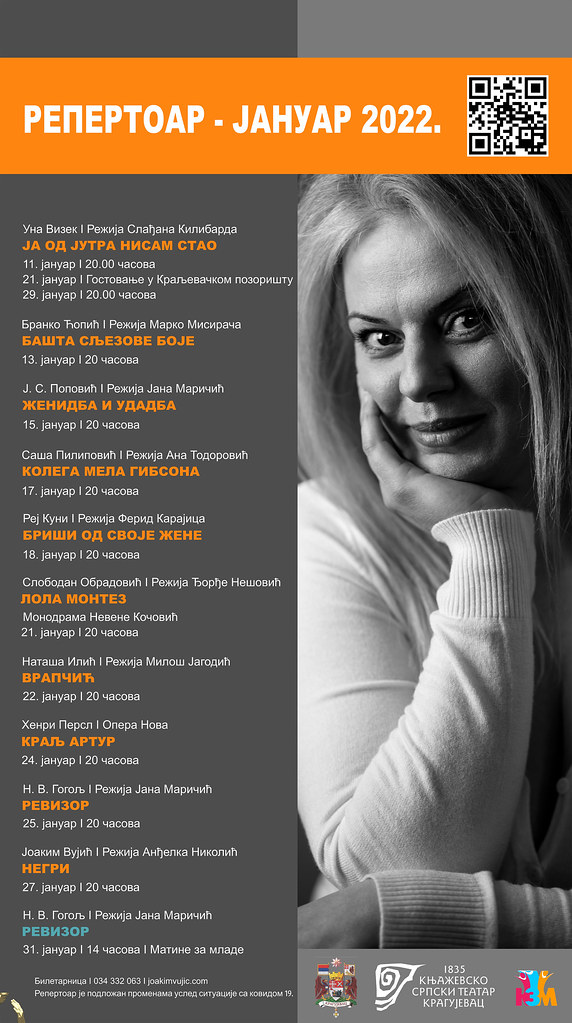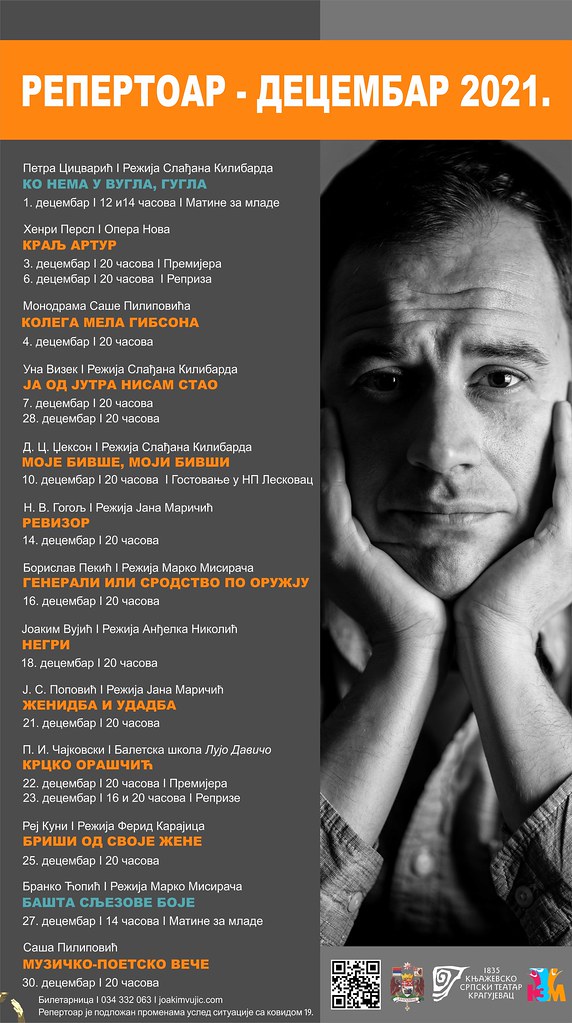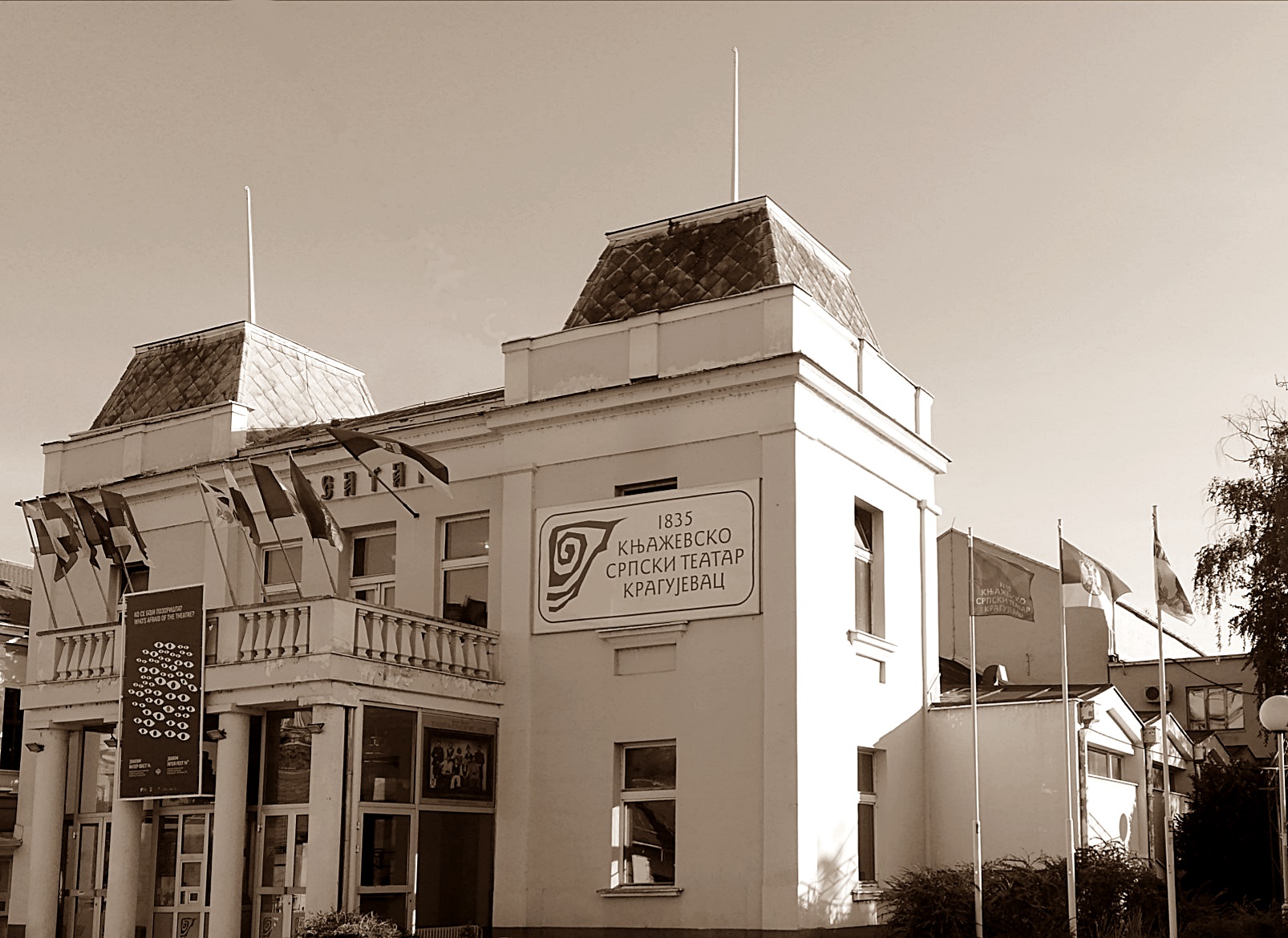Књажевско српски театар
Shared posts
РЕПЕРТОАР - јануар 2022. [Flickr]
[[ This is a content summary only. Visit my website for full links, other content, and more! ]]
Joakim Vujić’s Negri: how a forgotten Serbian classic was given new life
SEEstage January 6, 2022
In 2018, Andjelka Nikolić directed the premiere of a play by the ‘father of Serbian theatre’ Joakim Vujić. Duška Radosavljević Krojer explores why it took so long to bring it to the stage and the challenges of staging a play about race and colonialism in a modern Balkan context.
Two hundred years ago, in 1821, Joakim Vujić wrote a play called Negri, ili Ljubov ko sočelovekom svojim (The Blacks, or The Love Towards One’s Fellow Human). In 1821, Joakim Vujić, the man who would later become the ‘father of Serbian theatre’, had not yet visited Serbia. He had been born to Serbian parents in the Austro-Hungarian Empire in 1772, and as a young man and student he already travelled to Budapest, Vienna, Trieste (where he worked as a teacher of Serbian), as well as the Crimea, the Middle East and north Africa (as a scribe on a ship).
An autobiography he would later write unusually combined travel writing with multilingual sections in Serbian, Latin, Italian, French, Hungarian, German and Hebrew. Intending to move to Serbia, in 1806 he settled as a teacher in a border town of Zemun where he was arrested on suspicions of an international plot against the Austrian authorities. He used his six months in prison to translate Daniel Dafoe’s Robinson Crusoe. A significant detour on Vujić’s way to the homeland of his ancestors happened when in 1813 he staged in a Budapest theatre the first play ever performed in the Serbian language – his translation of August von Kotzebue’s Der Papagei (1792).
Authored some eight years later, Negri was therefore one of the first plays written by a Serbian author, although one who belonged to an ethnic minority within an empire. The play takes place on an unnamed island off the American coast. Its main characters are an English Lord Stuford, the owner of a sugar factory in America, his servant Jon, the American sugar factory manager Barington, his official Blinert, and a family of slaves working in the sugar plantation: Ksantilakva, his son Nakir, daughter Suli, and Suli’s fiancé Kvirli. As Lord Stuford visits the sugar factory incognito to check the working conditions, Suli is sentenced to death by manager Barington for stealing a sugar reed to feed her exhausted brother Nakir. The play eventually reaches a morally just ending, though not without great suffering.
The premiere only took place in 2018, in the Serbian city of Kragujevac where, incidentally, in 1834 Vujić managed to set up the first Serbian theatre, a year after his arrival in Serbia. Knjaževsko-srpski teatar (the Prince’s Serbian theatre), founded by appointment from Prince Miloš Obrenović, was a token of Serbia’s gradual liberation from centuries-long Ottoman rule at the time.
Why did it take so long for this play to see the light of the stage?
According to director Andjelka Nikolić, it’s because the text has until now had more historical rather than dramaturgical value. She had read it by accident in an anthology as a fresher on her directing course at the Faculty of Dramatic Art in Belgrade, having taken a professor’s task a bit too seriously, but it stood out for her as an indication of Vujić’s surprisingly wide-ranging worldview.
‘Vujić clearly understood theatre as a place for exploration of the bigger questions of the world’, she notes. And his theatre practice was not yet subject to the codes of realism that would mark the 20th century theatre-making tradition in Serbia, which may have been a further limiting factor for a director potentially choosing to stage this play before now. Nikolić felt, however, that the play had new significance in the context of present day examinations of the legacies of colonialism and was interested to explore this.
The Serbian context itself additionally has different modes of colonial histories than those which marked the western European colonialisms. For a long time the Balkans have been exempt from the topics of race and racism, although this has started to change in recent years thanks to the work of mostly international scholars (such as Catherine Baker, Andreja Mesarič, Paul Stubbs, Bojana Videkanić), bringing critical race theory into the field of Balkan studies. Nikolić’s approach however was driven by different, more locally embedded questions, and the methodological concerns specific to theatre-making.
Like Joakim Vujić, Andjelka Nikolić is a theatre-maker with a philological and anthropological curiosity. Besides having trained as a director, Nikolić is also a French and Dutch graduate, a published translator, and a co-founder with psychologist/director Irena Ristić of a research-oriented participatory youth theatre Hop.la!, whose most recent mission was the decentralisation of Serbian cultural politics through setting up a children’s cultural centre in the Serbian village of Markovac. In a culture dominated by the institutional repertory theatre model, the independent scene is desperately underfunded and amounts to a labour of love. It is also an indication of Andjelka Nikolić’s understanding of theatre as ultimately a ‘place for thinking through what it means to be a community’.
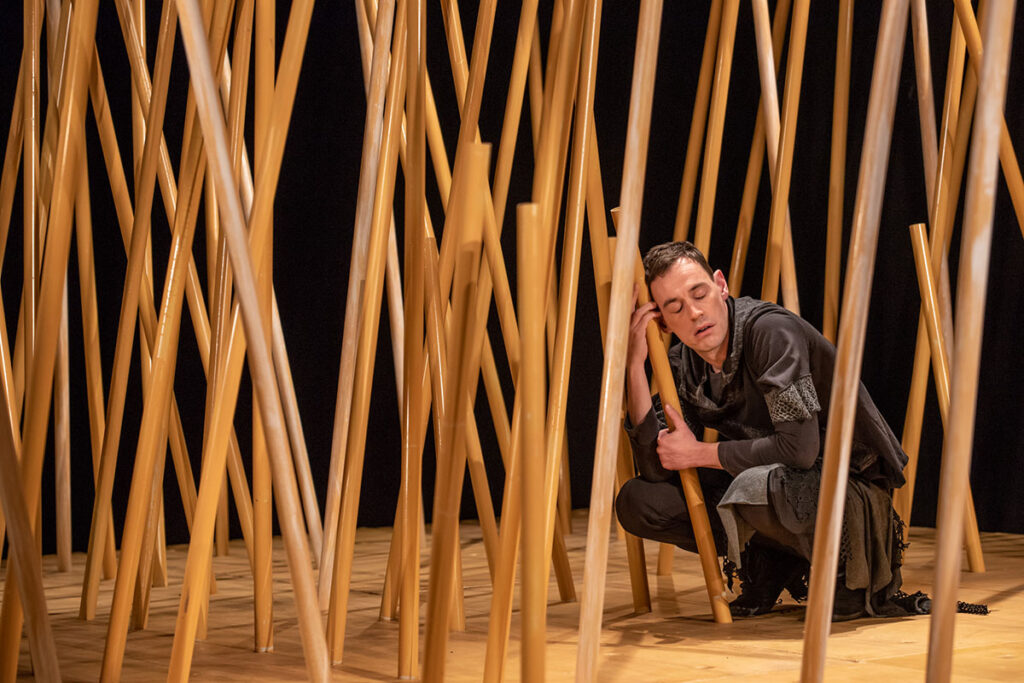
Andjelka Nikolić’s production of Negri. Photo: Slavoljub Radojevic
It’s no surprise then that this director’s primary response to the challenges Vujić’s play was the aspect of language. Negri – translated as Crnci into contemporary Serbian – was written in Slavonic-Serbian, the literary language of the Serbs in the Habsburg Empire, hybridised from old Russian, church Slavonic and the Serbian vernacular, and in official use until it was reformed some decades later by Vuk Stefanović Karadžić in favour of the vernacular. One of the main initial creative tasks was deciding how to render the original into the present day Serbian so that it would be sufficiently accessible to a contemporary audience ‘increasingly alienated from the language of theatre via film, the internet and the fast media’. There were several aspects to this process of rendition – one was the dialogue, which the director worked on with the actors and voice consultant Dejan Sredojević collaboratively producing what would eventually become the subtitles that accompany the performance. Here she was interested in retaining the nuances of the original that no longer exist in the Serbian vernacular – for example the term ‘sočelovek’ from the title, meaning approximately ‘fellow human’ but having no elegant equivalent in contemporary Serbian, determined the decision to speak the original lines and provide the subtitles for clarity.
Nikolić notes that Vujić himself problematizes his own use of the term ‘Negri’ in a footnote to the text where he clarifies that up until then this word had been used in plain Serbian to denote only Arabs and that it is his intention instead to more appropriately now denote the natives of Guinea, the people unfairly traded by the English, Spanish, Dutch and other Europeans to America where they are forced into hard labour ‘for the rest of their lives’. Interestingly too, Vujić provides within one of the monologues ascribed to the factory manager Barington, very specific factual information that ‘between 1785 and 1787 the French transported 21,652 slaves in 65 galleys from Guinea to the Dominican Republic’, which he uses as a basis to calculate the financial gain for the traders in a damning portrayal of the exploitative hegemonies.
Nikolić characterises the genre of Vujić’s play as a melodrama which was the target of her creative team’s intervention in treating more convincingly the unrealistically generous representation of the English Lord Stuford, and bringing the text closer to a contemporary political context and to the Serbian audience. However, she also makes the intuitive decision to amplify this seemingly incidental tendency of the original to carry footnotes by adding a number of her own: about the etymology of Guinea (‘Gine nai mora’ – ‘we are all women’ a frightened response given, according to a legend, by a group of Guinean women to the French colonisers), about the question of England’s Europeanness after Brexit, and about the ongoing modern day manifestations of slavery and mistreatments of human rights sanctioned by the liberal democracies.
Contrary to her own training as a theatre director based on the principle of ‘show rather than tell’, Nikolić forges a hyper-explicit framework for the piece which transforms Vujić’s melodrama into a type of Brechtian lehrstück. Another useful methodological opportunity is found in the long sentimental monologues of the original coupled with the unusual advantage of the Kragujevac Theatre having a post of a resident composer, Dragoslav Tanasković, whose availability to be embedded in the rehearsal process with his musicological expertise and deep familiarity with the ensemble resulted in a number of original songs. It is no wonder that this piece was a hit at a number of festivals including the annual Joakim Vujić Festival of Serbian theatres outside of Belgrade. Suddenly Joakim Vujić, who otherwise only has a dusty symbolic presence in Serbian culture, was presented as a living author.
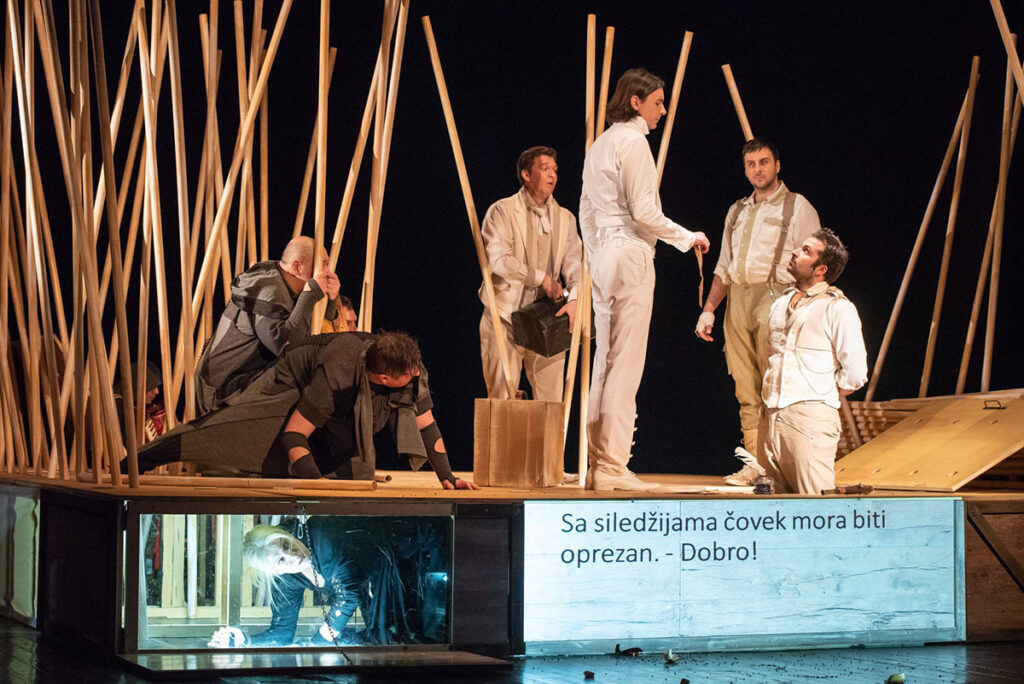
Andjelka Nikolić’s production of Negri. Photo: Slavoljub Radojevic
Unlike Nikolić’s participatory work in the independent sector, this piece belonging to the institutional theatre circuit, unfortunately offered little scope to engage in any dialogue with the audience, which might have been its only missed opportunity. I was particularly interested in what the audience would have made of the subtitles as in my own experience of watching I was aware of a process of reflection emerging from the gap between the language that is heard and its textual rendering.
The observed similarities and differences could raise questions in the audience about the translator’s reliability and this, in transpires, was a deliberate, playful and emancipatory strategy deployed by Nikolić who draws a parallel between her work as an official translator of French (where reliability is paramount) and her work as a theatre director which necessarily entails a degree of interpretive adaptation. She gleefully calls this aspect of her mediation between the text and the audience – ‘translational provocation’.
On a technical level, Nikolić says, the actors and herself deployed three registers in translating the text which ended up in the subtitles – the corporate language of business management, the language of the human rights, and the language of contemporary Serbian vernacular. And even though the ensemble were not unanimous from the outset as to the extent to which their process of interpretation of the original would become explicit in the final outcome, this sort of methodological exploration of the theatre-making process itself emerged as one of the significant results of the project that the director has taken further in her work.
Since Negri, Nikolić has tackled another forgotten Serbian classic Ajduci (Haidouks) by Jovan Sterija Popović in a similar way, and an African fairytale The Coconut Thieves, both made in 2021. Regarding her ongoing interest in colonialism, she has been developing over the last few years an approach to the African travelogues of the early twentieth century Serbian poet and diplomat, educated in France, Rastko Popović.
In this process she has been exploring a collaboration with Cameroon, although this has brought about new insights into what she calls ‘rascepljeni pogled’ – the gaze of the person from the Balkans ‘stretched to a breaking point’ by at the same time being representative of the colonised and emulating the gaze of the Europeans. In this respect, Nikolić describes the changing perception of the Other in the Serbian culture over time as moving from modes of demonization of the Ottoman occupier (‘the Turk’ or ‘the Arab’) found in the Serbian epic poetry, via the 19th century over-idealisation and exoticisation (found in Vujić’s work in amongst others) to the early 20th century position of in-betweeness or liminality (characteristic of Popović). This insight only became more defined in the aftermath of her work on Negri where the idea was to specifically follow Joakim Vujić in seeing the skin colour as a symbol of deprivation which can be abstracted and related to via other modes of oppression.
In Nikolić’s production this representation is only coded through the colour of the costumes ranging between black and white to indicate different shades of privilege among Vujić’s characters. In that case the task was therefore primarily to bring closer to a contemporary audience the 19th century text that was in turn commenting on a time and place removed from its own context of inception.
Since then, and especially in the light of the global Black Lives Matter movement, the tackling of this subject matter acquires different dimensions which are yet to be explored further in Serbian theatre.
In the meantime, it is perhaps worth noting one more interesting historical curiosity, also referenced in a final footnote of Nikolić’s Negri. In 1835, just a year after the foundation of the first Serbian theatre, Prince Miloš Obrenović’s government in newly autonomous Serbia, inspired by the French example, proclaimed its first constitution – the so called ‘Sretenjski ustav’ (‘Candlemas Constitution’). Some 30 years before the final abolition of slavery in America, this document contained the clause which stated that ‘The slave who set foot on the Serbian ground would automatically be freed from slavery and become a free human’.
Unfortunately, due to the scorn and pressure from the European powers at the time, including Russia, Austria-Hungary and the Ottoman Empire (whose interests such a document directly contravened), the first Serbian constitution and one of the earliest proclamations of the abolishment of slavery in Europe, was itself abolished just weeks after its proclamation.
Further reading: Darija Davidovic’s essay – Theatre is a memory machine
Duška Radosavljević Krojer is a writer, dramaturg and academic. She is the author of award-winning academic monograph Theatre-Making: Interplay Between Text and Performance in the 21st Century (2013) and editor of Theatre Criticism: Changing Landscapes (2016) and the Contemporary Ensemble: Interviews with Theatre-Makers (2013). Her work has been funded by the Arts and Humanities Research Council in the UK multiple times including for www.auralia.space (2020-21) and The Mums and Babies Ensemble (2015). She is a regular contributor to The Stage, Exeunt and The Theatre Times.
Joakim Vujić’s Negri: how a forgotten Serbian classic was given new life
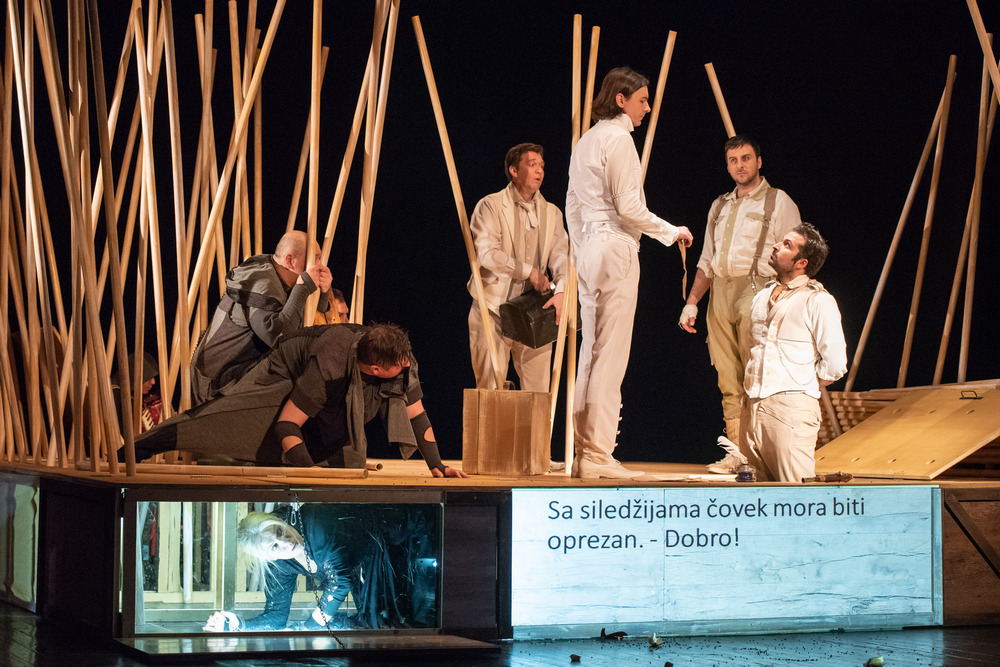
In 2018, Andjelka Nikolić directed the premiere of a play by the ‘father of Serbian theatre’ Joakim Vujić. Duška Radosavljević Krojer explores why it took so long to bring it to the stage and the challenges of staging a play about race and colonialism in a modern Balkan context.
Joakim Vujić’s Negri: how a forgotten Serbian classic was given new life
In 2018, Andjelka Nikolić directed the premiere of a play by the ‘father of Serbian theatre’ Joakim Vujić. Duška Radosavljević Krojer explores why it took so long to bring it to the stage and the challenges of staging a play about race and colonialism in a modern Balkan context.
Two hundred years ago, in 1821, Joakim Vujić wrote a play called Negri, ili Ljubov ko sočelovekom svojim (The Blacks, or The Love Towards One’s Fellow Human). In 1821, Joakim Vujić, the man who would later become the ‘father of Serbian theatre’, had not yet visited Serbia. He had been born to Serbian parents in the Austro-Hungarian Empire in 1772, and as a young man and student he already travelled to Budapest, Vienna, Trieste (where he worked as a teacher of Serbian), as well as the Crimea, the Middle East and north Africa (as a scribe on a ship).
An autobiography he would later write unusually combined travel writing with multilingual sections in Serbian, Latin, Italian, French, Hungarian, German and Hebrew. Intending to move to Serbia, in 1806 he settled as a teacher in a border town of Zemun where he was arrested on suspicions of an international plot against the Austrian authorities. He used his six months in prison to translate Daniel Dafoe’s Robinson Crusoe. A significant detour on Vujić’s way to the homeland of his ancestors happened when in 1813 he staged in a Budapest theatre the first play ever performed in the Serbian language – his translation of August von Kotzebue’s Der Papagei (1792).
Authored some eight years later, Negri was therefore one of the first plays written by a Serbian author, although one who belonged to an ethnic minority within an empire. The play takes place on an unnamed island off the American coast. Its main characters are an English Lord Stuford, the owner of a sugar factory in America, his servant Jon, the American sugar factory manager Barington, his official Blinert, and a family of slaves working in the sugar plantation: Ksantilakva, his son Nakir, daughter Suli, and Suli’s fiancé Kvirli. As Lord Stuford visits the sugar factory incognito to check the working conditions, Suli is sentenced to death by manager Barington for stealing a sugar reed to feed her exhausted brother Nakir. The play eventually reaches a morally just ending, though not without great suffering.
The premiere only took place in 2018, in the Serbian city of Kragujevac where, incidentally, in 1834 Vujić managed to set up the first Serbian theatre, a year after his arrival in Serbia. Knjaževsko-srpski teatar (the Prince’s Serbian theatre), founded by appointment from Prince Miloš Obrenović, was a token of Serbia’s gradual liberation from centuries-long Ottoman rule at the time.
Why did it take so long for this play to see the light of the stage?
According to director Andjelka Nikolić, it’s because the text has until now had more historical rather than dramaturgical value. She had read it by accident in an anthology as a fresher on her directing course at the Faculty of Dramatic Art in Belgrade, having taken a professor’s task a bit too seriously, but it stood out for her as an indication of Vujić’s surprisingly wide-ranging worldview.
‘Vujić clearly understood theatre as a place for exploration of the bigger questions of the world’, she notes. And his theatre practice was not yet subject to the codes of realism that would mark the 20th century theatre-making tradition in Serbia, which may have been a further limiting factor for a director potentially choosing to stage this play before now. Nikolić felt, however, that the play had new significance in the context of present day examinations of the legacies of colonialism and was interested to explore this.
The Serbian context itself additionally has different modes of colonial histories than those which marked the western European colonialisms. For a long time the Balkans have been exempt from the topics of race and racism, although this has started to change in recent years thanks to the work of mostly international scholars (such as Catherine Baker, Andreja Mesarič, Paul Stubbs, Bojana Videkanić), bringing critical race theory into the field of Balkan studies. Nikolić’s approach however was driven by different, more locally embedded questions, and the methodological concerns specific to theatre-making.
Like Joakim Vujić, Andjelka Nikolić is a theatre-maker with a philological and anthropological curiosity. Besides having trained as a director, Nikolić is also a French and Dutch graduate, a published translator, and a co-founder with psychologist/director Irena Ristić of a research-oriented participatory youth theatre Hop.la!, whose most recent mission was the decentralisation of Serbian cultural politics through setting up a children’s cultural centre in the Serbian village of Markovac. In a culture dominated by the institutional repertory theatre model, the independent scene is desperately underfunded and amounts to a labour of love. It is also an indication of Andjelka Nikolić’s understanding of theatre as ultimately a ‘place for thinking through what it means to be a community’.

Andjelka Nikolić’s production of Negri. Photo: Slavoljub Radojevic
It’s no surprise then that this director’s primary response to the challenges Vujić’s play was the aspect of language. Negri – translated as Crnci into contemporary Serbian – was written in Slavonic-Serbian, the literary language of the Serbs in the Habsburg Empire, hybridised from old Russian, church Slavonic and the Serbian vernacular, and in official use until it was reformed some decades later by Vuk Stefanović Karadžić in favour of the vernacular. One of the main initial creative tasks was deciding how to render the original into the present day Serbian so that it would be sufficiently accessible to a contemporary audience ‘increasingly alienated from the language of theatre via film, the internet and the fast media’. There were several aspects to this process of rendition – one was the dialogue, which the director worked on with the actors and voice consultant Dejan Sredojević collaboratively producing what would eventually become the subtitles that accompany the performance. Here she was interested in retaining the nuances of the original that no longer exist in the Serbian vernacular – for example the term ‘sočelovek’ from the title, meaning approximately ‘fellow human’ but having no elegant equivalent in contemporary Serbian, determined the decision to speak the original lines and provide the subtitles for clarity.
Nikolić notes that Vujić himself problematizes his own use of the term ‘Negri’ in a footnote to the text where he clarifies that up until then this word had been used in plain Serbian to denote only Arabs and that it is his intention instead to more appropriately now denote the natives of Guinea, the people unfairly traded by the English, Spanish, Dutch and other Europeans to America where they are forced into hard labour ‘for the rest of their lives’. Interestingly too, Vujić provides within one of the monologues ascribed to the factory manager Barington, very specific factual information that ‘between 1785 and 1787 the French transported 21,652 slaves in 65 galleys from Guinea to the Dominican Republic’, which he uses as a basis to calculate the financial gain for the traders in a damning portrayal of the exploitative hegemonies.
Nikolić characterises the genre of Vujić’s play as a melodrama which was the target of her creative team’s intervention in treating more convincingly the unrealistically generous representation of the English Lord Stuford, and bringing the text closer to a contemporary political context and to the Serbian audience. However, she also makes the intuitive decision to amplify this seemingly incidental tendency of the original to carry footnotes by adding a number of her own: about the etymology of Guinea (‘Gine nai mora’ – ‘we are all women’ a frightened response given, according to a legend, by a group of Guinean women to the French colonisers), about the question of England’s Europeanness after Brexit, and about the ongoing modern day manifestations of slavery and mistreatments of human rights sanctioned by the liberal democracies.
Contrary to her own training as a theatre director based on the principle of ‘show rather than tell’, Nikolić forges a hyper-explicit framework for the piece which transforms Vujić’s melodrama into a type of Brechtian lehrstück. Another useful methodological opportunity is found in the long sentimental monologues of the original coupled with the unusual advantage of the Kragujevac Theatre having a post of a resident composer, Dragoslav Tanasković, whose availability to be embedded in the rehearsal process with his musicological expertise and deep familiarity with the ensemble resulted in a number of original songs. It is no wonder that this piece was a hit at a number of festivals including the annual Joakim Vujić Festival of Serbian theatres outside of Belgrade. Suddenly Joakim Vujić, who otherwise only has a dusty symbolic presence in Serbian culture, was presented as a living author.

Andjelka Nikolić’s production of Negri. Photo: Slavoljub Radojevic
Unlike Nikolić’s participatory work in the independent sector, this piece belonging to the institutional theatre circuit, unfortunately offered little scope to engage in any dialogue with the audience, which might have been its only missed opportunity. I was particularly interested in what the audience would have made of the subtitles as in my own experience of watching I was aware of a process of reflection emerging from the gap between the language that is heard and its textual rendering.
The observed similarities and differences could raise questions in the audience about the translator’s reliability and this, in transpires, was a deliberate, playful and emancipatory strategy deployed by Nikolić who draws a parallel between her work as an official translator of French (where reliability is paramount) and her work as a theatre director which necessarily entails a degree of interpretive adaptation. She gleefully calls this aspect of her mediation between the text and the audience – ‘translational provocation’.
On a technical level, Nikolić says, the actors and herself deployed three registers in translating the text which ended up in the subtitles – the corporate language of business management, the language of the human rights, and the language of contemporary Serbian vernacular. And even though the ensemble were not unanimous from the outset as to the extent to which their process of interpretation of the original would become explicit in the final outcome, this sort of methodological exploration of the theatre-making process itself emerged as one of the significant results of the project that the director has taken further in her work.
Since Negri, Nikolić has tackled another forgotten Serbian classic Ajduci (Haidouks) by Jovan Sterija Popović in a similar way, and an African fairytale The Coconut Thieves, both made in 2021. Regarding her ongoing interest in colonialism, she has been developing over the last few years an approach to the African travelogues of the early twentieth century Serbian poet and diplomat, educated in France, Rastko Popović.
In this process she has been exploring a collaboration with Cameroon, although this has brought about new insights into what she calls ‘rascepljeni pogled’ – the gaze of the person from the Balkans ‘stretched to a breaking point’ by at the same time being representative of the colonised and emulating the gaze of the Europeans. In this respect, Nikolić describes the changing perception of the Other in the Serbian culture over time as moving from modes of demonization of the Ottoman occupier (‘the Turk’ or ‘the Arab’) found in the Serbian epic poetry, via the 19th century over-idealisation and exoticisation (found in Vujić’s work in amongst others) to the early 20th century position of in-betweeness or liminality (characteristic of Popović). This insight only became more defined in the aftermath of her work on Negri where the idea was to specifically follow Joakim Vujić in seeing the skin colour as a symbol of deprivation which can be abstracted and related to via other modes of oppression.
In Nikolić’s production this representation is only coded through the colour of the costumes ranging between black and white to indicate different shades of privilege among Vujić’s characters. In that case the task was therefore primarily to bring closer to a contemporary audience the 19th century text that was in turn commenting on a time and place removed from its own context of inception.
Since then, and especially in the light of the global Black Lives Matter movement, the tackling of this subject matter acquires different dimensions which are yet to be explored further in Serbian theatre.
In the meantime, it is perhaps worth noting one more interesting historical curiosity, also referenced in a final footnote of Nikolić’s Negri. In 1835, just a year after the foundation of the first Serbian theatre, Prince Miloš Obrenović’s government in newly autonomous Serbia, inspired by the French example, proclaimed its first constitution – the so called ‘Sretenjski ustav’ (‘Candlemas Constitution’). Some 30 years before the final abolition of slavery in America, this document contained the clause which stated that ‘The slave who set foot on the Serbian ground would automatically be freed from slavery and become a free human’.
Unfortunately, due to the scorn and pressure from the European powers at the time, including Russia, Austria-Hungary and the Ottoman Empire (whose interests such a document directly contravened), the first Serbian constitution and one of the earliest proclamations of the abolishment of slavery in Europe, was itself abolished just weeks after its proclamation.
Further reading: Darija Davidovic’s essay – Theatre is a memory machine
The post Joakim Vujić’s Negri: how a forgotten Serbian classic was given new life appeared first on See Stage.
Мир Божји, Христос се роди!
Радно време билетарнице у јануару 2022. године:
— 4.-6. јануар од 10-14 часова
— од 10. јануара у редовним терминима од 10-14 часова, на дан извођења представе 10-14 и 18-20 часова
Репертоар је подложан променама услед ситуације са ковидом 19.
СРЕЋНИ НОВОГОДИШЊИ И БОЖИЋНИ ПРАЗНИЦИ!

Радно време билетарнице у јануару 2022. године.
НОВОГОДИШЊЕ МУЗИЧКО-ПОЕТСКО ВЕЧЕ

Глумци Књажевско-српског театра, на затварању позоришне 2021. године, представиће се крагујевачкој публици у оквиру Новогодишње музичко-поетске вечери.
РЕПЕРТОАР - децембар 2021. [Flickr]
[[ This is a content summary only. Visit my website for full links, other content, and more! ]]
ЈА ОД ЈУТРА НИСАМ СТАО
Режија: Слађана Килибарда
УЛОГЕ:
ЈЕДИНИЦА Милош Крстовић
ДВОЈКА Душан Станикић
ТРОЈКА Чедомир Штајн
ЧЕТВОРКА Никола Милојевић
КОМШИНИЦА Исидора Рајковић
ПРВА Сања Матејић
Премијера: 6.11.2021. године
Сезона 2021/22.
Knjaževsko-srpski teatar is the oldest Serbian Theatre based in City of Kragujevac, Serbia, was founded in 1835. Knjaževsko-srpski teatar est la plus ancienne de Théâtre basée à la Ville de Kragujevac, Serbie, a été fondée en 1835. Knjaževsko-srpski teatar ist das älteste serbische Theater mit dem Sitz in der Stadt Kragujevac, Serbien, gegründet 1835. Knjaževsko-srpski teatar è il più antico Teatro Serbo con sede a Città di Kragujevac, Serbia, è stata fondata nel 1835. Княжеско-сербский театр - старейший сербский театр, oснован в городе Крагуевац, в 1835 году. Knjaževsko-srpski teatar es el teatro servio más viejo fue fundado adentro 1835. Se basa adentro Kragujevac, la cuarta ciudad más grande de Serbia. Knjaževsko-Srpski teatar είναι το παλαιότερο σερβικό θέατρο ιδρύθηκε μέσα 1835. Είναι βασισμενός μέσα Kragujevac, η τέταρτη μεγαλύτερη πόλη Σερβία. Knjaževsko-srpski teatar 是最旧的塞尔维亚人剧院 它根据 Kragujevac第四大城市 塞尔维亚. 剧院被创办了 1835 由 Miloš Obrenović, 塞尔维亚的王子. 在时候, 当剧院被创办了, 市Kragujevac 首先是现代独立的资本 塞尔维亚. [نجفسكو-سربسكي] [تتر] القديمة ساحة. هو أسّست داخل [كرغجفك], المدينة رابعة كبيرة من صربيا. أسّست الساحة كان داخل 1835 ب [ميلو] [أبرنوفي], أمير صربيا. في الوقت عندما أسّست ساحة كان, مدينة [كرغجفك] كان أولى رأس مال من عضو مستقلّ حديثة صربيا.
КЊАЖЕВСКО-СРПСКИ ТЕАТАР ДОМАЋИН 58. ФЕСТИВАЛА ЈОАКИМ ВУЈИЋ
У мају 2022.године Књажевско-српски театар је домаћин 58. Фестивала професионалних позоришта Србије Јоаким Вујић.
Град Крагујевац и Књажевско-српски театар су организатори Фестивала у години када се обележава 250.година од рођења Јоакима Вујића.
Фестивал професионалних позоришта Србије Јоаким Вујић, смотру позоришних представа у Републици Србији јужно од Београда основали су 1965. године председници општина у којима су постојала професионална позоришта.
РЕПЕРТОАР - децембар 2021.
КО НЕМА У ВУГЛА, ГУГЛА
Среда, 1. децембар 12, 14 и 16.00 часова - Матине за младе
КЕАЉ АРТУР
ХЕНРИ ПЕРСЛ, Опера Нова
Петак, 3. децембар 20.00 часова - премијера
Понедељак, 6. децембар 20.00 - реприза
КОЛЕГА МЕЛА ГИБСОНА
Субота, 4. децембар 20.00 часова
ЈА ОД ЈУТРА НИСАМ СТАО
Уторак, 7. и 28. децембар 20.00 часова
МОЈЕ БИВШЕ, МОЈИ БИВШИ
Гостовање у НП Лесковац, 10. децембар 20.00 часова
РЕВИЗОР
Уторак, 14. децембар 20.00 часова
ГЕНЕРАЛИ ИЛИ СРОДСТВО ПО ОРУЖЈУ
Четвртак, 16. децембар 20.00 часова
НЕГРИ
Субота, 18. децембар 20.00 часова
ЖЕНИДБА И УДАДБА
Уторак, 21. децембар 20.00 часова
КРЦКО ОРАШЧИЋ
П. И. ЧАЈКОВСКИ, Балетска школа Лујо Давичо
Среда, 22. децембар 20.00 часова - премијера
Четвртак, 23. децембар 16 и 20.00 часова - репризе
БРИШИ ОД СВОЈЕ ЖЕНЕ
Субота, 25. децембар 20.00 часова
БАШТА СЉЕЗОВЕ БОЈЕ
Понедељак, 27. децембар 14.00 часова - Матине за младе
МУЗИЧКО-ПОЕТСКО ВЕЧЕ - Саша Пилиповић
Четвртак, 30. децембар 20.00 часова
Репертоар је подложан променама услед ситуације са ковидом 19.
РЕПЕРТОАР - децембар 2021. [Flickr]
[[ This is a content summary only. Visit my website for full links, other content, and more! ]]
РЕПЕРТОАР - децембар 2021.
РЕПЕРТОАР - децембар 2021.
Јубилеј Саше Пилиповића

Саша Пилиповић обележава 30 година уметничког рада у Књажевско-српском театру.
РЕПЕРТОАР - новембар 2021.
Repertoar - oktobar 2021. [Flickr]
РЕПЕРТОАР - новембар 2021.
ЈА ОД ЈУТРА НИСАМ СТАО - премијера
Субота, 6. новембар 20.00 часова
ЈА ОД ЈУТРА НИСАМ СТАО - прва реприза
Уторак, 9. новембар 20.00 часова
ЈА ОД ЈУТРА НИСАМ СТАО - друга реприза
Четвртак, 11. новембар 20.00 часова
РЕВИЗОР
Субота, 13. новембар 20.00 часова
БЛИТВА И КРОМПИР
Уторак, 16. новембар 20.00 часова
БРИШИ ОД СВОЈЕ ЖЕНЕ
Четвртак, 18. новембар 20.00 часова
ВРАПЧИЋ
Субота, 20. новембар 20.00 часова
АКО СЕ ПРОБУДИШ ИЛИ КАО ДА ЈЕ ВАЖНО
Уторак, 23. новембар 20.00 часова
НП Лесковац
ОПЕТ ПЛАЧЕ, АЛ' САД ОД СРЕЋЕ
Четвртак, 25. новембар 20.00 часова
КОЛЕГА МЕЛА ГИБСОНА - монодрама
Петак, 26. новембар 20.00 часова
Саша Пилиповић - 30 година уметничког рада
ЈА ОД ЈУТРА НИСАМ СТАО
Субота, 27. новембар 20.00 часова
БАЈКА О МРТВОЈ ЦАРЕВОЈ КЋЕРИ
Уторак, 30. новембар 20.00 часова
Репертоар је подложан променама услед ситуације са ковидом 19.
ЈА ОД ЈУТРА НИСАМ СТАО [Flickr]
REPERTOAR_septembar_2021 [Flickr]
Sećanje na prof. dr Dragana Klaića (1950-2011)
U okviru pratećeg programa 16. kragujevačkog Joakimfesta 14.10. u 12.00 u Knjaževsko-srpskom teatru održaće se tribina pod nazivom Sećanje na prof. dr Dragana Klaića.
Dragan Klaić, istoričar pozorišta i kulturni analitičar
Bio je stalni saradnik udruženja Felix Meritis u Amsterdamu i predavao kulturnu politiku i umetnost na univerzitetu u Lajdenu.
Studije dramaturgije završio je u Beogradu, a doktorirao istoriju pozorišta i kritiku drame na Jejl univerzitetu u Sjedinjenim Američkim Državama. Radio je kao pozorišni kritičar i dramaturg, bio profesor na Fakultetu dramskih umetnosti u Beogradu i Univerzitetu u Amsterdamu, a gostujući profesor u Americi, Budimpešti i Bolonji, direktor Holandskog Pozorišnog Instituta od 1992. do 2001. godine, suosnivač evropskog pozorišnog časopisa Evromaske.
Njegove knjige i radovi objavljeni su u bivšoj Jugoslaviji pre 1991, ali i u Velikoj Britaniji, Americi, Holandiji i Norveškoj. Bio je angažovan i kao urednik časopisa Pozorište (SAD) i član nekoliko savetodavnih odbora u Budimpešti, Briselu, Stokholmu i Hagu.
(preuzeto iz knjige Početi iznova, Dragan Klaić, Clio, 2016. Beograd)
The post Sećanje na prof. dr Dragana Klaića (1950-2011) appeared first on Joakimfest.
РЕПЕРТОАР - октобар 2021.
МОЈЕ БИВШЕ, МОЈИ БИВШИ
Уторак, 5. октобар 20.00 часова
БАШТА СЉЕЗОВЕ БОЈЕ
Уторак, 19. октобар 20.00 часова
ГЕНЕРАЛИ ИЛИ СРОДСТВО ПО ОРУЖЈУ
Четвртак, 21. октобар 20.00 часова
РЕВИЗОР
Четвртак, 28. октобар 20.00 часова
16. ЈОАКИМФЕСТ
Међународни позоришни фестивал, 8-15. октобар
ГОСТОВАЊА ТЕАТРА
ОПЕТ ПЛАЧЕ, АЛ' САД ОД СРЕЋЕ
2. октобар, Међународни позоришни фестивал СКАМПА
Елбасан, Албанија
МОЈЕ БИВШЕ, МОЈИ БИВШИ
18. октобар Краљевачко позориште
МОЈЕ БИВШЕ, МОЈИ БИВШИ
22. октобар Крушевачко позориште
Репертоар је подложан променама услед ситуације са копвидом 19.
Joakimfest
The International Theatre Festival – JoakimInterFest (Joakimfest), was named after one of the most important personalities of the Serbian theatre, Joakim Vujić (1772–1847). A writer, comedian, translator, traveler and general manager of the first Serbian theatre founded in Kragujevac, the then capital of Serbia in 1835, Joakim Vujić is at the same time the most controversial and intriguing figure in Serbian theatre history.
His libertarian spirit, an impressive number of works, which he left as a legacy and everything he did for the beginnings of the development of organized theatrical life in Serbia, brought him the epithet of ”the father of Serbian theatre”.
JoakimInterFest was founded in 2006 on the initiative of the then general manager of the Princely Serbian Theatre, director Dragan Jakovljević, and with great understanding and support from the City of Kragujevac. The then administrations of the theatre and the City of Kragujevac respectively, recognized the need for an international theatre festival that would improve theatre life in this area, and provide loyal Kragujevac audience and employees of this theatre with insight and information into new theatre trends.
Thus, the Princely Serbian Theatre, with its significant tradition, has become the initiator of a more than necessary theatrical exchange, which intensified that segment of theatrical life in this part of Serbia, south of Belgrade.
LIFE AFTERWARDS
(thirty years later)
Closed theatres, inability to travel, unknown budget, uncertainty over whether the festival will be held due to the COVID-19 pandemic… these are all circumstances facing all curators who are trying to come up with a concept for some of the many autumn theatre festivals. “Everything is possible in the theatre”, many of us still believes in that, but how, in such uncertainty, should oneoutline and devise a concept that should carry the potential of a high degree of feasibility? And the dramaturgical question in these circumstances would be, is there a topic able to “outplay” the coronavirus and its dominance in our lives? Can we still imagine life after COVID-19?
My first decision was that I would not select performances deliberately tackling the virus subject. The second decision was geographically-related, having all performances be from the region of the former Yugoslavia. There are two reasons for this. The first is that in this region, unlike in some others, despite all the limitations and problems, the plays were still being made and performed. The second, more important reason for me, is that exactly 30 years ago, the disintegration of the once joint state began. And to anticipate all anti-Yugoslavs and disappoint Yugo-nostalgic people, Yugoslavia is not the topic of my selection. Thirty years is a long enough period to scan this region through topics that theatres and some new young theatre people deal with. Life Afterwards is my intimate, subjective view of this region and theatre, 30 years later.
Can a theatre festival tell a story? The Kragujevac audience will look for the answer to this question in the following performances:
- The Use of Man – based on the novel by Aleksandar Tišma, dramatized by Fedor Šili, and directed by Boris Liješević / co-produced by Novi Tvrđava Theatre, Theatre City Budva / Novi Sad Theatre (Újvidéki Színház) and East-West Center from Sarajevo
- Our Warehouse – Tjaša Mislej, directed by Mateja Kokol, Prešeren Theatre from Kranj (Slovenia)
- As If the End Were Not Quite Near – Maja Pelević, directed by Nikola Zavišić / Bitef Theatre
- Only Voice – Nina Plavanjac, directed by Marjan Nećak, Macedonian National Theatre from Skopje (North Macedonia)
- Obscene Days of Johnny Long Johnson – a novel by Filip Grujić, dramatized by Dimitrije Kokanov, directed by Jovana Tomić / Novi Sad Theatre (Újvidéki Színház)
- They Shoot Horses, Don’t They? – Based on Horace McCoy’s novel, dramatized and directed by Martin Kočovski, National Theatre Bitola (North Macedonia) – video recording of the performance
- Seven Terrors – based on the novel by Selvedin Avdić, dramatized by Emina Omerović and Selma Spahić, directed by Selma Spahić / Bosnian National Theatre Zenica in co-production with the 20th the Festival of Bosnian Drama, Zenica 2021 (Bosnia and Herzegovina)
This selection would be more complete in the conceptual finishing of the selection if it included two more plays: My Husband by Rumena Bužurovska, directed by Ivana Đilas / Slovene National Theatre Drama in Ljubljana and Conspiracy Theory, author project by Filip Jurjević, Marina Lisjak and Marina Pejnović / Satirical Theatre Kerempuh from Zagreb.
Joakimfest is a festival that, in all its selections during these 15 years, has taken care to give a chance to fresh young people in addition to well-known authors. I don’t think I have failed that tradition. For the first time at this festival,we can see: Tjaša Mislej and Mateja Kokol, who, with the play Our Warehouse, bring us closer to the more current and painful topic of exploiting female labor in the warehouse of a hypermarket by means of humor. The young playwright Nina Plavanjac, on the other hand, portrays a strong woman, an actress, whose loneliness forces her to face her own vulnerability but also to find enough strength to resist being manipulated by others. It is precisely in the text Only Voice, by this young author, that the composer and director Marjan Nećak has found the inspiration for his musical stage research. Filip Grujić, a young playwright and writer, who is also debuting at Joakimfest, put his debut novel Obscene Days of Johnny Long Johnson into the hands of an equally young but already well-coordinated director-dramaturge duo, Jovana Tomić and Dimitrije Kokanov, who, collaborating with a great authorship team, created a very attractive and witty play. Speaking of tried-and-tested director-dramaturge duos, Maja Pelević and Nikola Zavišić can also be included. In the interactive audio-visual installation As If the End Were Not Quite Near, in which only five people can participate, using only their voices, they invite a small audience to transition from this world to digital reality in an attempt to think of some new forms of coexistence and unity of man and machine. The question that the author’s team asks is whether it is possible today, more than ever, in loneliness and isolation, with distorted perception of reality, to build new forms of togetherness?
The experienced director-dramaturge tandem, Boris Liješević and Fedor Šili, are known for their love of tackling serious and difficult literary challenges. This time they come with a great dramatization of the anthological novel The Use of Man, by Aleksandar Tišma, about the tragic fate of people in wartime, of the fate of several families who lived before, during and after the Second World War. It’s a play that warns us that war psychology easily and quickly turns a person into a commodity, into means for carrying out other people’s objectives.
The Bosnian National Theatre from Zenica and director Selma Spahić have always been well received and awarded at the Joakimfest. For Selvedin Avdić, one of the multitudes of great Bosnian writers who have been attracting more and more attention of readers in the region and beyond in recent years, this is the second collaboration with the director at the theatre in Zenica. The first was on the great performance My Factory. As someone who feels great respect for theatres that on their stages deal with the themes of their communities, I consider the play Seven Terrors, tackling the wartime events in Zenica, an incredibly brave act and a significant play both in theatrical and civic sense.
For the past year and a half in Serbia, theatre people have often been saying that a video recording of a theatre performance canin no way replace a live performance, even though no one even disputesthat. At the moment when the theatres in North Macedonia had been closed for months, an online premiere of the performance based on the text by Horace McCoy They Shoot Horses, Don’t They and directed by Martin Kochovski was madeat the National Theatre in Bitola. In the online broadcast of the play, Martin Kochovski included, with intelligence and dramaturgical skill, the context of the closed theatre, the empty hall, the distance between people, in the technique around the stage and on the stage. In that way, he dramatically intertwined fiction from the stage with the documentary aspect of the situation in which the theatre is forbidden to stage performances. No matter how much this performance is staged live in theatres and at festivals, it will never have that aspect of documentary recording and testimony of one moment, as a recording has.
These are the seven performances that will hopefully, through their themes, stage deliberation and aesthetics, tell the story of life afterwards and outplay the coronavirus.
26.08.2021.

